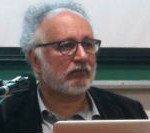April 2017
Vivian Mannheimer | Blog de HCS-Manguinhos
The seminar “Zika, social sciences and humanites,” held on March 30th at Ensp/Fiocruz gathered researchers from international institutions to discuss the social aspects of the disease, such as the effects of campaigns and sexual rights.

Sheila Maria Ferraz Mendonça de Souza, deputy-director of research and innovation Ensp/Fiocruz and Nísia Trindade Lima, president of Fiocruz. Photo: Virginia Damas, Ensp/Fiocruz.
This was the first meeting of the Social Sciences Research Group of ZIKAlliance, a multinational and multi-disciplinary research consortium comprised of partners worldwide and coordinated by Inserm, the French National Institute of Health and Medical Research.
Nísia Trindade Lima, president of Fiocruz and co-chair of the Social Sciences Research Group of ZIKAlliance, said that it is a major challenge to work with the human and social aspects of an epidemic in which efforts are focused mainly on diagnosis, treatment and on the mosquito:
“this is not about a war of mosquitoes against humanity, but about social processes that explain this proliferation. However, in the media and on people’s imaginary this is the strongest association,” she said.
Nísia added that this research network also means an opportunity to discuss sexual rights in Brazil, an issue that re-emerged in the zika outbreak. She also mentioned some aims of the consortium, including proposals for an integrated research agenda and a shared database.
The side effects of interventions
Jocelyn Raud, co-chair of of the Social Sciences Research Group of ZIKAlliance talked about the side effects of interventions against vector-borne diseases.

Jocelyn Raud (Inserm and Université Sorbonne Paris Cité). Photo: Virginia Damas, Ensp/Fiocruz.
“We tend to underestimate the complexity of both social and natural worlds and even when the intention is to improve health or reduce the circulation of the virus, sometimes we can worsen the situation,” he highlighted.
The researcher explained that health campaigns tend to promote changes in behavior, such as stimulating the use of condoms in the case of AIDS.
However, when the disease rates fall, the population tends to relax in the protective behavior and as a consequence the number of cases may rise again.
With experience in vector-borne disease analysis in French tropical territories, such as Réunion and French Guiana, Jocelyn mentioned some examples of campaigns that have had negative effects.
One of the them was the case of West Nile Virus in Colorado. In 2003, two adjacent cities had severe outbreaks of the disease. Unexpectedly, disease rates were higher in the city with a more extensive mosquito control program, due to the tendency of abandoning protective measures when a disease is under control.
The scientific facts about zika
Ilana Löwy, researcher at Inserm explained that her presentation was inspired by Ludvick Fleck 1935 classical study The Genesis and Development of a Scientific Fact, in which he argues that cognition is always a collective activity.

Ilana Löwy (Inserm) is also associated researchr at Casa de Oswaldo Cruz/Fiocruz. Photo: Virginia Damas Ensp/Fiocruz.
In order to discuss the scientific facts about zika, she quoted the former US secretary of defense Donald Rumsfeld, who had declared in the context of the Iraq War that there are things we know that we know, things that we know we don’t know and things that we don’t know we don’t know.
The researcher said that in the case of zika we already know that the disease can cause Guillan-Barre syndrome and microcephaly, but we do not know why there is such a large concentration of brain malformations in Northeast Brazil and not in other parts of the country or in Africa.
 She added a fourth category to approach the facts about zika – things that we know, but consciously or unconsciously we decide to ignore.
She added a fourth category to approach the facts about zika – things that we know, but consciously or unconsciously we decide to ignore.
Regarding the ignored facts about zika, Ilana mentioned the sexual transmission.
“In the US zika discussion is only about sexual transmission, but here in Brazil we don’t talk much about that. There are so many mosquitoes that it is hard to tell when zika is transmitted sexually or by the mosquito,” she noted.
Zika and the problem of neglect in global health
The dynamics of defining priorities on global health were addressed by João Nunes, lecturer in International Relations at the University of York.
According to the researcher, neglect in global health should be understood beyond its most common idea, that certain diseases do not serve to the interests of big players or donors.

João Nunes, lecturer on International Relations at the University of York. Photo: Virginia Damas Ensp/Fiocruz.
João admits that interests are important, but highlights that this element alone can not explain why certain issues emerge into the global health agenda and others don’t.
The researcher further stated that neglect is fundamentally a relationship between groups.
“The relationship that produces neglect is one of domination. Some groups are systematically placed in a position of subordination and disadvantage,” he said.
Regarding zika, João believes that the disease got a lot of attention, but he added that “it is not a matter of quantity of attention, it is about the quality of attention.”
Using ebola as an example, the researcher said that neither the efforts employed nor the visibility on media changed the neglected status of the disease, which is still seen as an African problem.








